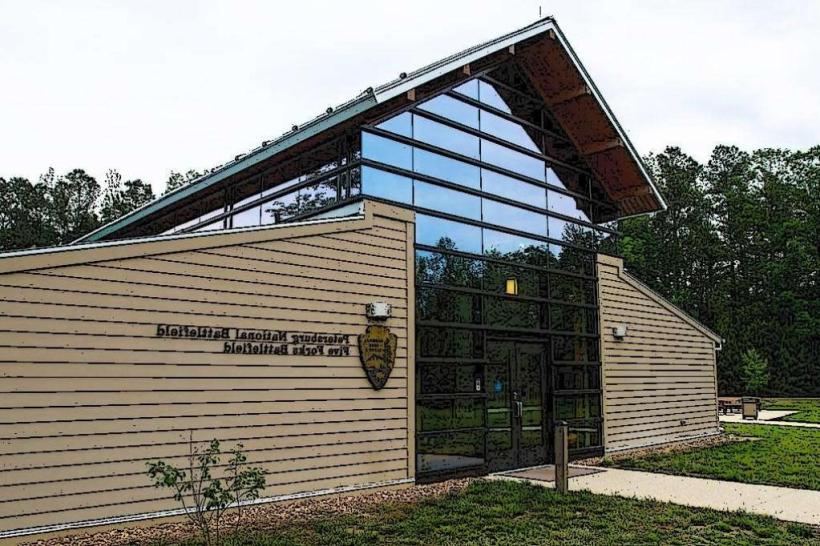Information
Landmark: Appomattox ManorCity: Petersburg
Country: USA Virginia
Continent: North America
Appomattox Manor, Petersburg, USA Virginia, North America
Appomattox Manor, located within the historic grounds of City Point in Hopewell, Virginia, is a significant site that played a pivotal role during the American Civil War. It is an elegantly preserved antebellum plantation house and now serves as a museum interpreting the complex military and social history of the Civil War’s concluding phases.
Historical Background and Location
Appomattox Manor was built around 1760 by Thomas Shore and later acquired by the affluent Harrison family in the early 19th century. The manor is situated on a strategic peninsula where the James and Appomattox Rivers converge, near the town of Hopewell, roughly 20 miles southeast of Richmond, Virginia.
Its location was of immense military importance during the Civil War because City Point (the manor’s surrounding area) became the primary logistical and supply base for the Union Army during the Siege of Petersburg (1864–1865). This area effectively served as General Ulysses S. Grant’s headquarters and was one of the largest and busiest ports of the war, crucial for troop movements, supply shipments, and communication.
Architectural Features
Appomattox Manor exemplifies Georgian-style plantation architecture typical of the Virginia Tidewater region. The house is a two-story, five-bay brick structure with symmetrical windows and classic elements like a gabled roof and chimneys on each end.
The manor’s interior has been preserved and restored to reflect its mid-19th-century appearance, showcasing period furnishings, woodwork, and artifacts that illustrate the lifestyle of a wealthy planter family before the war. The house’s setting on the peninsula provides sweeping views of the rivers and the surrounding battlefield landscapes.
Role During the Civil War
With the Union’s advancement into Virginia and the start of the Petersburg Campaign in 1864, the Union Army seized City Point and transformed it into a massive supply depot and command center. Appomattox Manor was commandeered by the Union forces and served as General Grant’s headquarters for much of the campaign.
The manor functioned as a nerve center for the Union’s operations, where strategic decisions were made that ultimately led to the fall of Petersburg and Richmond. The efficient supply line running through City Point was vital in maintaining Union troop strength and momentum during the prolonged siege.
Additionally, the manor and its grounds witnessed the presence of numerous Union officers, including General Grant, Admiral David Dixon Porter, and General William Tecumseh Sherman, among others. The site offers insight into the logistical challenges and military coordination that characterized the final year of the Civil War.
Post-War and Museum Development
After the war, the Harrison family regained possession of Appomattox Manor, but over time the property passed through various owners. In the 20th century, preservation efforts began to recognize the manor’s historical significance, particularly its Civil War associations.
Today, Appomattox Manor is managed as part of the National Park Service’s Petersburg National Battlefield complex. The manor operates as a museum and visitor center that educates the public about the Civil War’s military strategies, the daily lives of soldiers and civilians, and the critical role City Point played in Union victory.
Exhibits and Visitor Experience
The museum inside Appomattox Manor presents detailed exhibits on several themes:
Military Logistics: Displays illustrate how the Union Army managed one of the largest and most efficient supply networks of the war, including docks, railroads, and warehouses.
Leadership and Strategy: The manor’s rooms highlight the roles of Grant and his generals, showcasing maps, correspondence, and personal effects.
Life at City Point: Interpretive materials explore the lives of soldiers, support personnel, enslaved African Americans, and local civilians affected by the war effort.
African American History: The site provides information about the formerly enslaved people who sought refuge behind Union lines and contributed as laborers and guides during the siege.
Guided tours and interpretive programs often include walking tours of the surrounding battlefield, riverfront docks, and related Civil War sites in the Petersburg area, helping visitors understand the broader strategic context.
Architectural and Natural Setting
The manor’s grounds include well-maintained gardens and riverfront views that help recreate the atmosphere of the 19th century. The setting offers a tranquil contrast to the violent history that unfolded nearby.
Visitor Information
Location: Appomattox Manor is situated within the Petersburg National Battlefield Park at City Point, Hopewell, Virginia.
Hours: Generally open during park hours, with seasonal variations; visitors are advised to check current schedules.
Admission: Free of charge, as part of the National Park Service offerings.
Facilities: Includes museum exhibits, ranger-led programs, picnic areas, and nearby hiking trails.
Significance
Appomattox Manor stands as a crucial link to understanding the Civil War’s final campaign. Its dual role as both a plantation home and a Union command post encapsulates the conflict’s complex intersections of Southern culture, military strategy, and the transition toward the war’s end. The manor and its exhibits provide a comprehensive, tangible experience that deepens public appreciation of this transformative chapter in American history.







